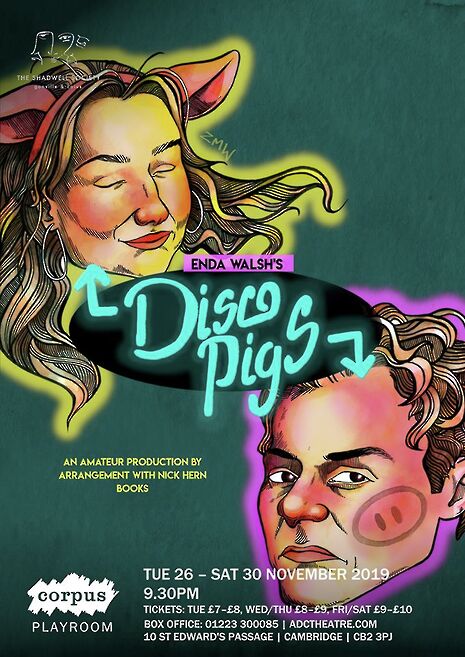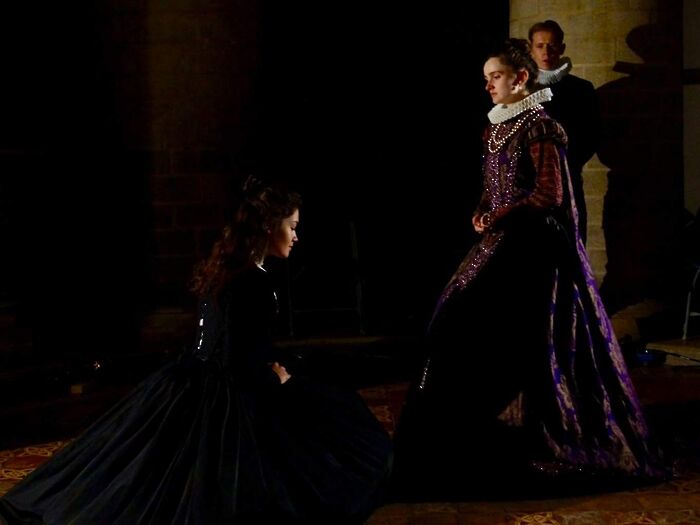Disco Pigs is chaotic and poignant
Coslett and Wheble give heartfelt performances, let down only by a struggle with accent
Disco Pigs bursts onto the Corpus stage with a force of raw chaotic energy and takes you on a tour of the Cork underworld through the eyes of two wild teenagers. Gabriel Wheble and Meg Coslett play Pig and Runt respectively, a pair with a dysfunctional view of life and each other that threatens to implode and cause serious harm. Enda Walsh’s fantastic 1996 play is a fantastic fit for these energetic actors but the full impact is somewhat limited by the stumbling block of trying to achieve a clear but authentic Cork accent.

Pig and Runt have been inseparable since they were born, tearing around Cork caring about nothing but each other for 17 years. They plan to go out on the town and run wild as they’ve always done but things are different now that they’re on the edge of adulthood. There’s a sinister edge to the fights that Pig gets himself into and a sense of paralysis in Runt’s longing to explore different possibilities for her life. Disco Pigs follows the pair on this eventful night and exposes the audience to the ins and outs of their incredibly close and often unsettling relationship.
Walsh’s play turns the spotlight on this turning point in the teenagers’ lives; the train of childlike chaos that they created together on looks like it’s running out of steam for Runt and in danger of veering off the tracks for Pig. This sense of disconnect is what makes Disco Pigs so affecting for the audience; there’s melancholy in seeing two people drift apart from their shared worldview but mainly a sense of danger that comes from any shifts in this dysfunctionally close friendship. Ben Vince’s direction brings this tension to life with his excellent direction, really emphasising the intense physical dynamic between Pig and Runt throughout the play and staying true to the unique tone of Walsh’s dialogue.
The first thing that strikes the audience as the play bursts to life is the distinctive Cork accents necessitated by the source material. At some points, it works well and helps to situate the play within 90s South-West Ireland. However, there are also times where the accents and quick pace mean that some plot details aren’t entirely clear, creating some confusing moments where Walsh’s writing devices don’t land in the way they should. At points, it also seemed as if Wheble’s accent got lost somewhere in the Mid-Atlantic, aiming for Cork but landing somewhere further west. Nonetheless, credit must be given for the significant effort put in to respect the setting crucial to the play.
"Vince does a fantastic job of reflecting the key tensions haunting the play through his direction"
Disco Pigs really stands out for its fantastic use of physicality, telling the audience exactly what they need to know about the characters even where the dialogue can’t. Wheble’s wide eyes and slouched stance is every bit the overgrown teenage boy, motivated by his passions and full of bubbling energy but with a childlike ignorance or indifference to the damage his physical power can cause. Coslett mirrors this childlike energy, stomping about and losing herself completely in the primal euphoria of dancing with Pig, yet occasionally using stillness to create delicate moments of tender sadness.
Vince does a fantastic job of reflecting the key tensions haunting the play through his direction, particularly the balance between Runt and Pig’s childhood friendship and the edge of sexuality creeping in. Heavy breathing from their wild dancing becomes charged with uneasy desire as they share very familiar physical contact. In this way, the tone is established for Pig’s graphic speeches about Runt’s body later. The dramatic choice to light the scene with just a torch gives this aspect of the production an additional pointed intensity, vividly conveying the change which adolescence has imposed on their relationship.
Design elements are used sparingly but effectively and help give expression to the specific type of restless teenage energy, as well as creating some shocking dramatic moments. Pig and Runt’s costumes are perfect for expressing the complex relationship that they each have with their own age and maturity, particularly through Runt’s dungarees, sparkly tights and space buns.
Vince has done Walsh’s play justice in this intense and affecting production of Disco Pigs, aided by two very talented and capable actors. The struggle with accents should not be ignored as it certainly affects the audience’s experience and understanding of the plot but the strength of the actors’ physicality and emotional expression carries the play forward regardless. Disco Pigs is a fantastic offering for Week 7, bringing a wild and colourful night in Cork to Cambridge.
 News / Downing Bar dodges college takeover31 January 2026
News / Downing Bar dodges college takeover31 January 2026 Comment / College rivalry should not become college snobbery30 January 2026
Comment / College rivalry should not become college snobbery30 January 2026 Fashion / A guide to Cambridge’s second-hand scene2 February 2026
Fashion / A guide to Cambridge’s second-hand scene2 February 2026 Lifestyle / Which Cambridge eatery are you?1 February 2026
Lifestyle / Which Cambridge eatery are you?1 February 2026 News / Deborah Prentice overtaken as highest-paid Russell Group VC2 February 2026
News / Deborah Prentice overtaken as highest-paid Russell Group VC2 February 2026








